Morococan Travel slogan
Morocco, Land of Light
Before embarking on our journey to Morocco with Intrepid Travel , we dedicated a significant amount of time to researching the country’s culture and traditions. We were eager to embody the principle of being good and respectful guests, fully aware that our actions could significantly influence our experience. While our research provided a solid foundation, it was our excellent Intrepid guide, Hamid, who offered invaluable insights, bringing the customs and rituals of Morocco to life in ways we could not have anticipated.
Morocco is a land where ancient traditions meet vibrant cultures, presenting visitors with a unique and enriching experience. From the bustling souks of Marrakech to the serene landscapes of the Atlas Mountains, the country is steeped in customs that reflect its rich history and diverse heritage. Understanding and respecting these traditions not only enhances a traveler’s experience but also fosters mutual respect and cultural appreciation.
So grab a cup of mint tea and learn about this fascinating and magnificent Moroccan culture.
Important Morocco Customs and Traditions
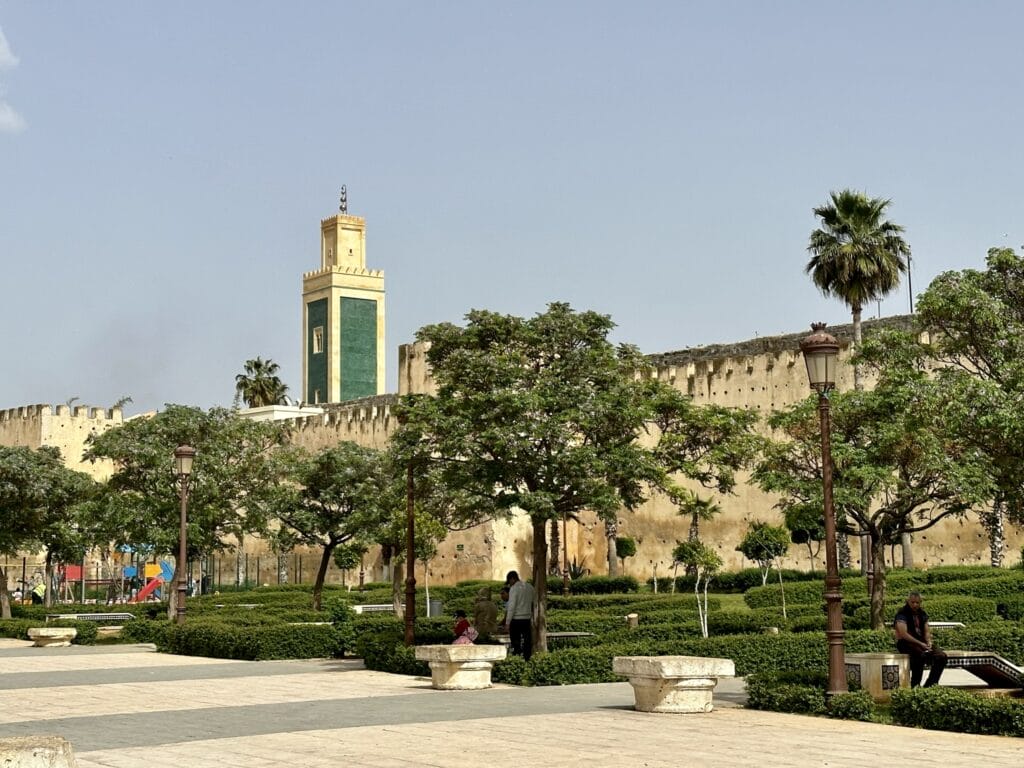
Greeting Etiquette
In Morocco, greetings are more than just formalities; they are deeply rooted in cultural practices. A typical Moroccan greeting involves a handshake with your right hand, often accompanied by a light touch of the cheek if the parties are of the same gender. When greeting someone of the opposite sex, men may offer a handshake, while women may prefer a nod or verbal salutation to avoid physical contact. Close friends and family may greet each other with a hug or a kiss on both cheeks.
Handshaking Practices
In Moroccan culture, the right hand is used for most social interactions, including handshakes. It is considered clean and proper for greeting and exchanging items and money (tips), while the left hand is reserved for personal tasks, i.e., using the bathroom. You will need to remind yourself of this often.
A handshake is generally firm but not overpowering, and when greeting someone of the same gender, it may be accompanied by a light touch of the cheek or a hug among close friends and family.
Dress Code
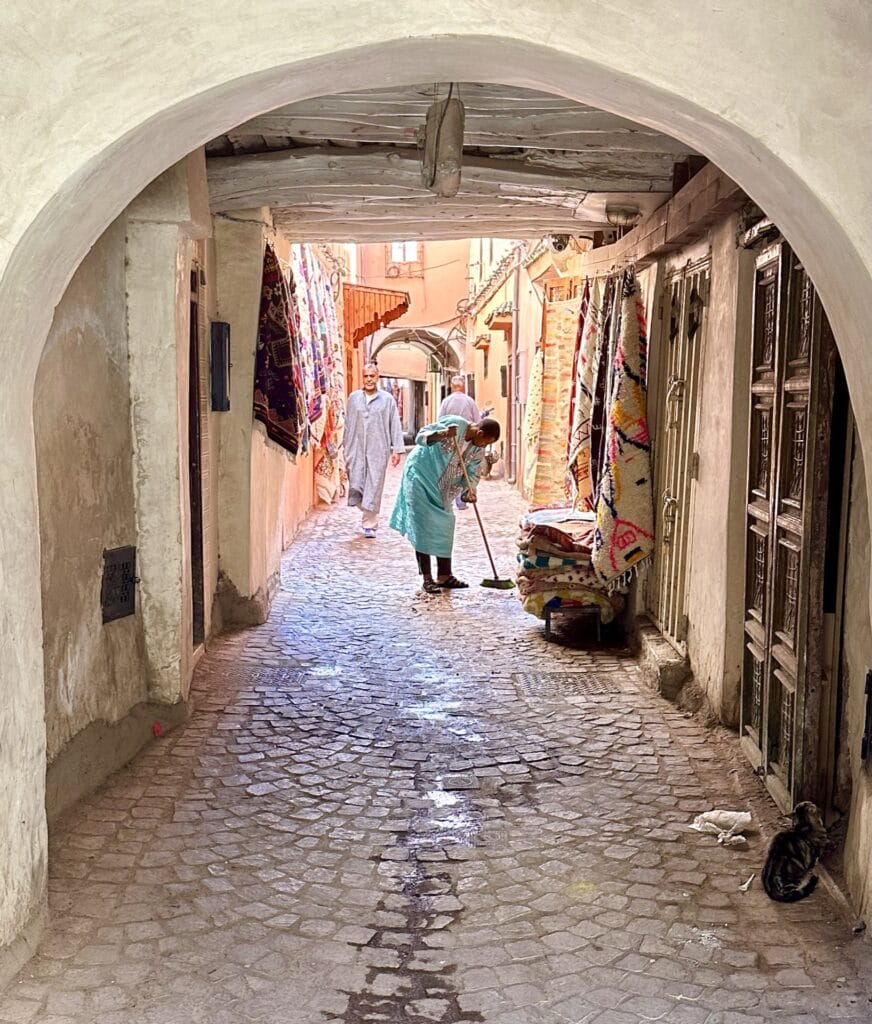
Moroccan attire is a vivid reflection of the country’s rich cultural and religious values. In urban areas, while Western clothing is generally accepted, modesty remains paramount. Women are encouraged to wear dresses or skirts that cover their knees, along with tops that have sleeves, while men should refrain from wearing shorts in formal settings. In rural areas, traditional garments such as the *djellaba*—a long, hooded robe—and the *kaftan* are commonly worn, showcasing the country’s heritage and craftsmanship.
Respecting local dress codes, particularly in religious or conservative areas, is crucial for honoring Moroccan traditions. As a guest in this vibrant country, embracing these customs not only demonstrates respect but also enriches your experience by allowing for a deeper connection with the local culture. Remember, thoughtfully dressing is a way to show appreciation for the hospitality and values of your Moroccan hosts.
Moroccan Hand Washing Rituals
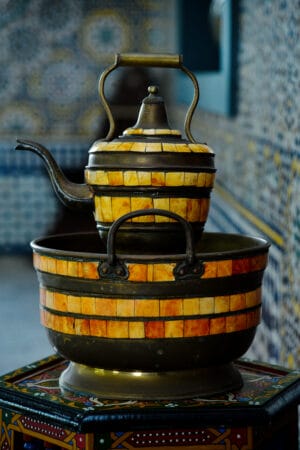
In Moroccan culture, hand washing is a vital practice, especially before and after meals, embodying values of cleanliness and respect. The traditional ritual, known as rassel , involves pouring water from a communal pitcher over the hands, transforming this everyday task into a meaningful social ceremony.
This ritual occurs at the start of a meal, allowing diners to cleanse themselves and demonstrating the host’s hospitality. It fosters a sense of community and connection as everyone participates, symbolizing gratitude for the food and the effort that went into its preparation. After the meal, rewashing hands reinforces the importance of hygiene and etiquette.
Often accompanied by warm water infused with fragrant herbs, this practice enhances the dining experience and showcases the host’s thoughtfulness. By understanding and participating in Rassel , visitors not only enrich their experience but also demonstrate appreciation for Moroccan traditions, creating a deeper connection with the culture and its people.
Our mantra is “You are a guest in their home, so be a good one.” Learn more by checking out our article on Mastering Travel Etiquette: A Guide to Being A Good Traveler .
Hospitality and Tea Rituals
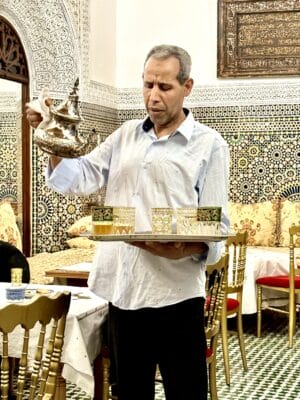
Moroccan hospitality is renowned for its warmth and generosity. We can attest to that, and it was remarkable. Visitors are often greeted with traditional Moroccan mint tea, known locally as atay or thé à la menthe , which symbolizes welcome and friendship. The tea is prepared with green tea leaves, fresh mint, and a generous amount of sugar.
The ritual of serving and drinking tea involves a specific process. It is poured from a height to create a frothy top. Most often, the head of the household will serve the mint tea. Accepting this tea and participating in the ritual is a gesture of respect; to refuse would often be considered an insult to your host. During our time in Morocco, we drank A LOT of mint tea.
Dining Etiquette
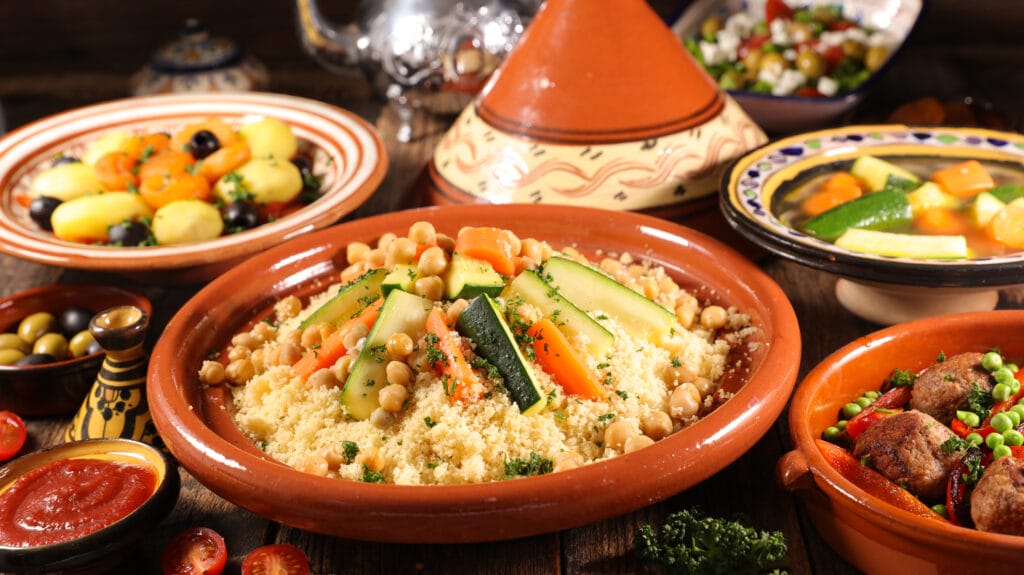
Meals in Morocco are typically a communal experience, fostering connection and camaraderie among diners. It is customary to eat with the right hand, using bread to scoop food from a shared platter rather than relying on utensils. Staples of Moroccan cuisine, such as tajin—a slow-cooked stew—and couscous, are often featured at these gatherings.
Refusing food made by your host can cause significant distress to your host that lasts long after you depart. Ir, which may be perceived as a failure in hospitality. During our Intrepid tour, we often dined in private homes, and we needed to eat what was presented to us. The suggestion was that if you do not want to eat something, mentioning an allergy or sensitivity is more diplomatic than declining outright. Additionally, offering compliments about the meal is customary and appreciated, reinforcing the bond of gratitude and respect between host and guest.
Souk Bargaining
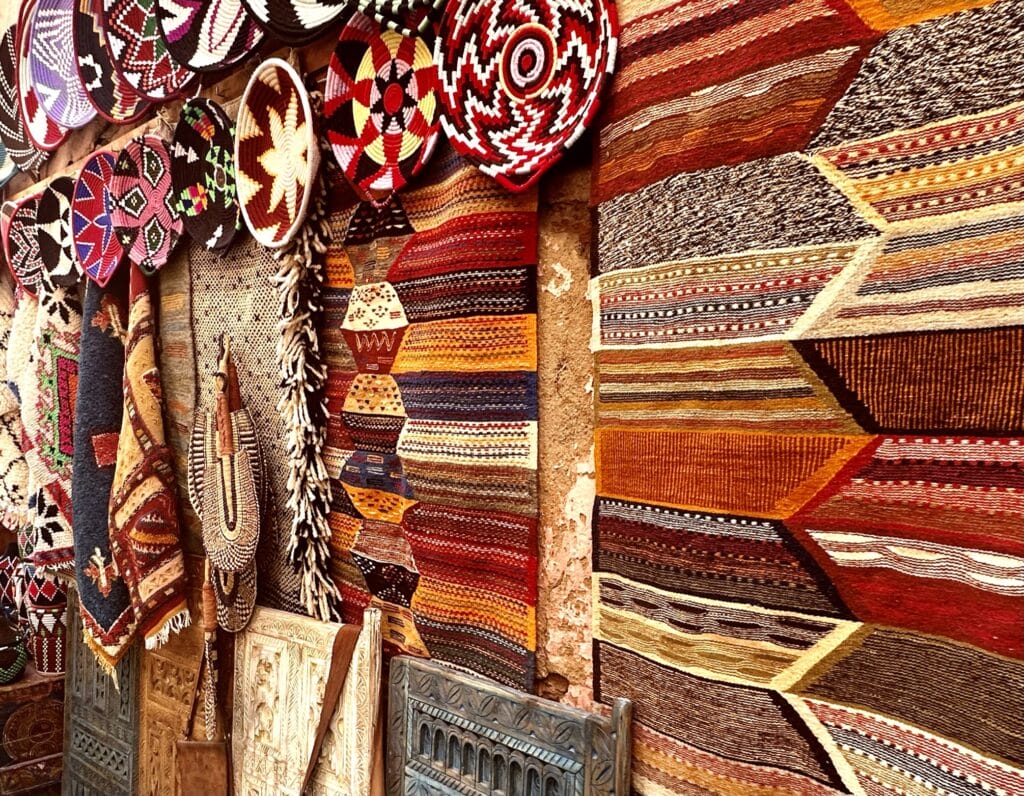
Shopping in Moroccan souks (markets) is an engaging experience characterized by lively interactions and bargaining. Haggling over prices is not only expected but is an integral part of the shopping process. However, it should be done with respect and good humor. Building rapport with vendors can lead to better deals and a more enjoyable shopping experience.
We had braced ourselves for the possibility of being harassed or aggressively pursued to make purchases, but to our pleasant surprise, that was not the case. While we did encounter strong sales tactics within the stores, vendors generally did not follow us once we stepped outside. Tourism is a vital industry in Morocco, and the government has implemented strict regulations to curb the intimidation tactics that some tourists have experienced in the past. We’ve heard that undercover tourist police are now monitoring behavior to ensure that visitors are treated with respect and hospitality. This enhanced focus on customer care made our experience much more enjoyable and stress-free.
Religious Practices and Sites
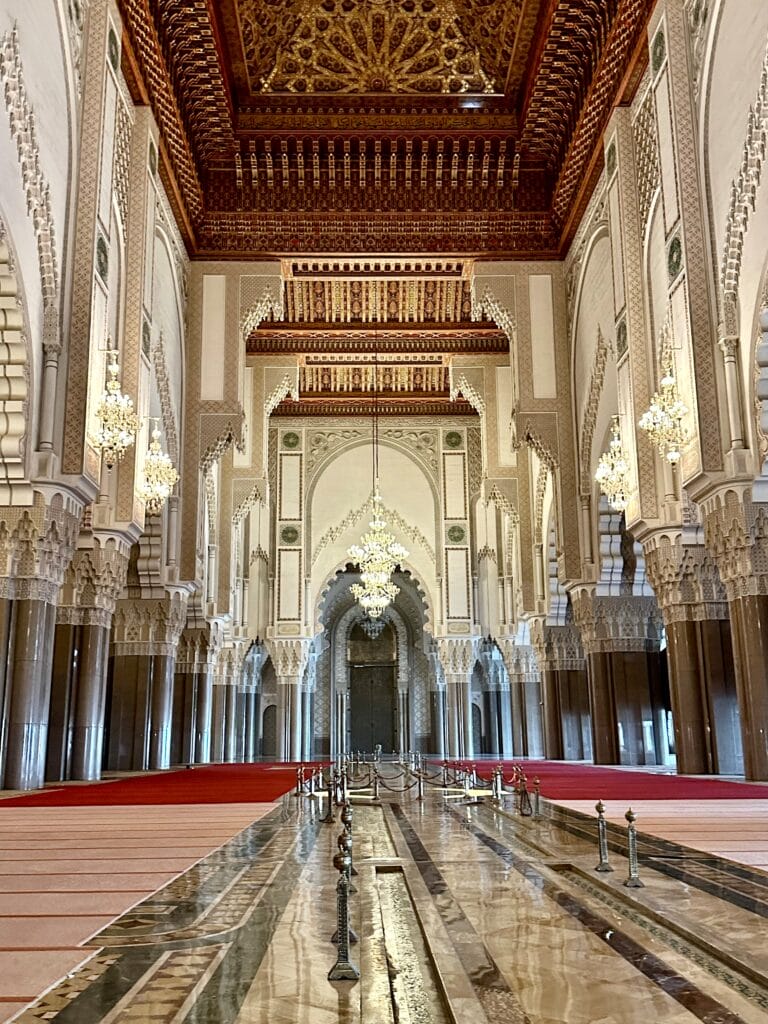
Morocco is predominantly Muslim, and religious practices are deeply woven into the fabric of daily life. When visiting mosques and other religious sites, visitors need to dress modestly, with women typically covering their shoulders and knees and men avoiding shorts. Non-Muslims are generally not permitted to enter the prayer areas of mosques, although some may offer guided tours that provide insights into the architecture and significance of the site.
Respecting local customs surrounding prayer times and religious observances is crucial for fostering positive interactions with the local community. During prayer times, it’s common for many businesses to pause, so visitors should plan their activities accordingly. Being mindful of these practices not only shows respect for Moroccan culture but also enriches your experience by allowing for deeper connections and understanding of the country’s rich traditions.
Ramadan Observances
Ramadan, the sacred month of fasting observed by Muslims, is a profound time for spiritual reflection and communal solidarity. During this period, Moroccans fast from dawn until sunset, abstaining from food, drink, and smoking. It’s important for visitors to be mindful of this practice; eating or drinking in public during daylight hours can be seen as disrespectful.
Heightened charitable activities and vibrant community gatherings also mark Ramadan. The breaking of the fast, known as iftar , is a special occasion, often celebrated with family and friends. Shared meals during this time foster connection and strengthen bonds, making it a unique and meaningful experience for both locals and visitors alike. Engaging with the customs of Ramadan can provide travelers with a deeper understanding of Moroccan culture and its values.
Our visit to Morocco coincided with Ramadan. While many had cautioned us that it might pose challenges, we found that experiencing this profound period in Moroccan life added a layer of authenticity to our journey. Observing the traditions and communal spirit of Ramadan enriched our understanding of the culture and made our time there even more meaningful.
The Role of Women in Moroccan Society
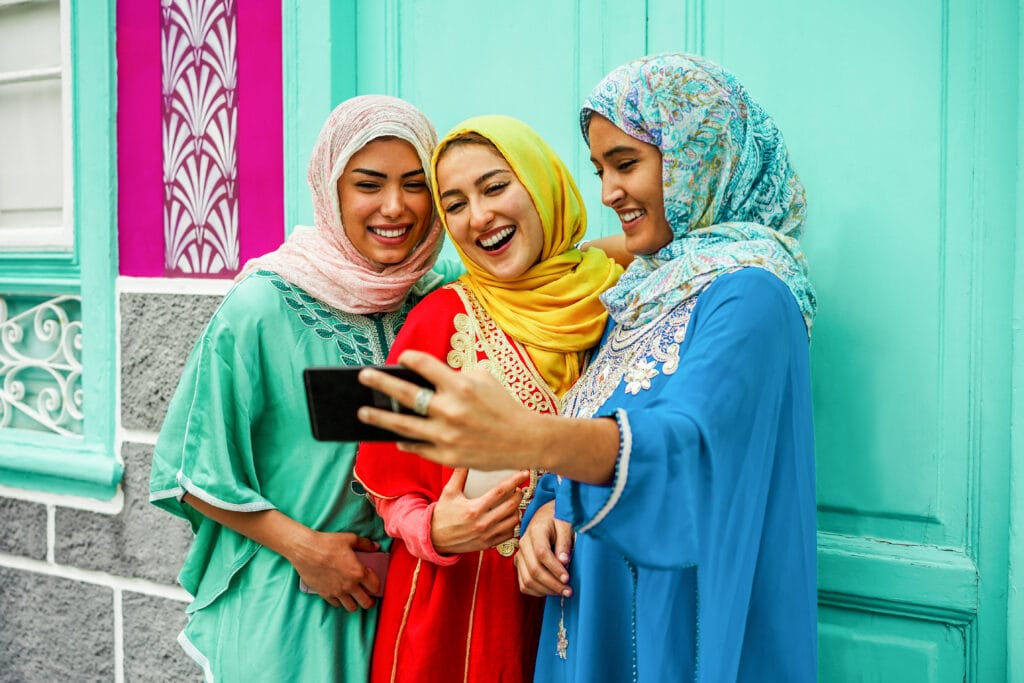
Moroccan society is traditionally patriarchal, and gender roles can vary significantly between urban and rural areas. Women often have distinct roles within the family and community, influencing their participation in public life. While women may take on visible roles in urban areas, traditional practices still apply, especially in rural settings. Be mindful of cultural norms regarding interactions with women, particularly avoiding physical contact unless initiated by them.
During our tour, our Moroccan guide shared an insightful story that challenged common perceptions. He explained that while some outsiders may view Moroccan culture as one that regards women as lesser, the reality is quite different; women are often placed on a pedestal. He illustrated this point with this example: when the Moroccan soccer team had a strong performance in the World Cup, they were honored in an audience with the King—who did they bring as their plus one? Their moms This highlights the deep respect and admiration for women in Moroccan society.
Check out our Morocco Travel Guide for lots of travel planning info
Public Behavior
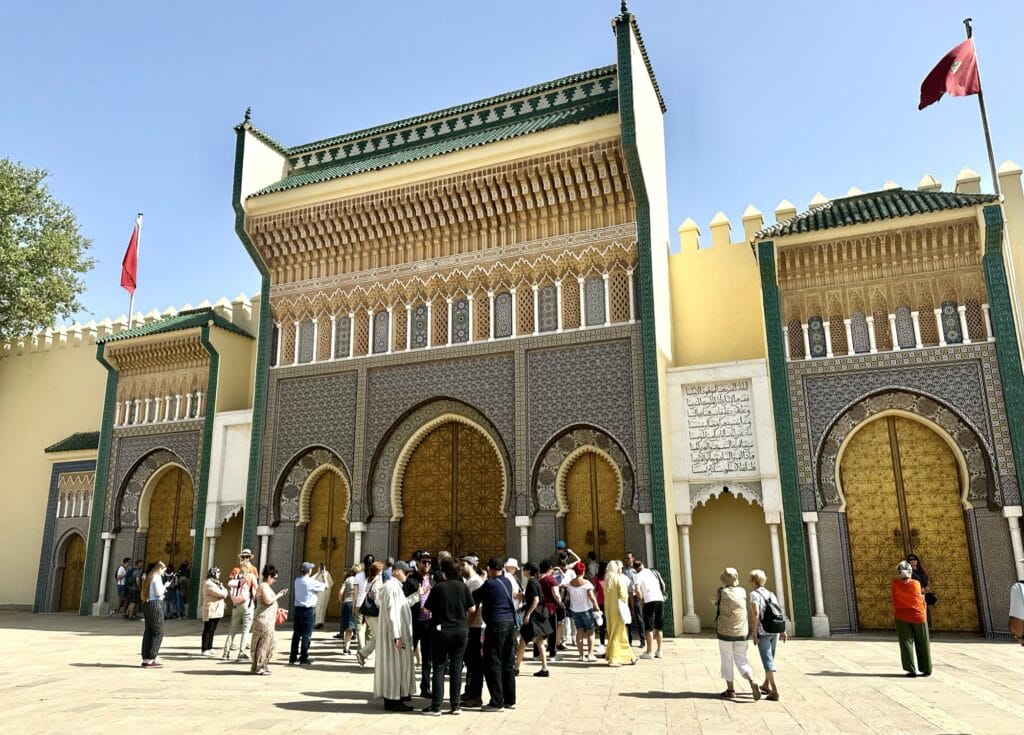
Holding hands, kissing, and other public displays of affection are generally frowned upon in Moroccan society and can be perceived as intrusive or disrespectful. In many public spaces, such behaviors may attract unwanted attention and make residents uncomfortable. This cultural norm stems from deep-rooted values surrounding modesty and decency, where maintaining a level of decorum in public is prioritized.
While Moroccans are warm and welcoming, visitors must respect their boundaries. While affectionate gestures in private settings are perfectly acceptable, it’s advisable to keep interactions more reserved in public. By understanding and honoring these cultural sensitivities, travelers can show respect for local customs and enjoy a more positive experience during their visit.
Family Values In Morocco
Family life is at the heart of Moroccan culture, serving as the cornerstone of social structure and community cohesion. Throughout our travels, we were struck by the deep loyalty and commitment that Moroccans have to their families. In homes across the country, it’s common to see multiple generations living together, sharing responsibilities and nurturing strong bonds. This interconnectedness fosters a sense of belonging and support, as family members prioritize each other’s well-being above all else.
Witnessing this emphasis on the family left a profound impression on all of us. Whether during festive gatherings or simple daily interactions, the warmth and respect that family members showed one another reflected the values of care and devotion inherent in Moroccan society. It was a beautiful reminder of the importance of family ties, illustrating how love and loyalty can transcend cultural boundaries and create lasting connections.
The Role of the Hammam in Moroccan Culture
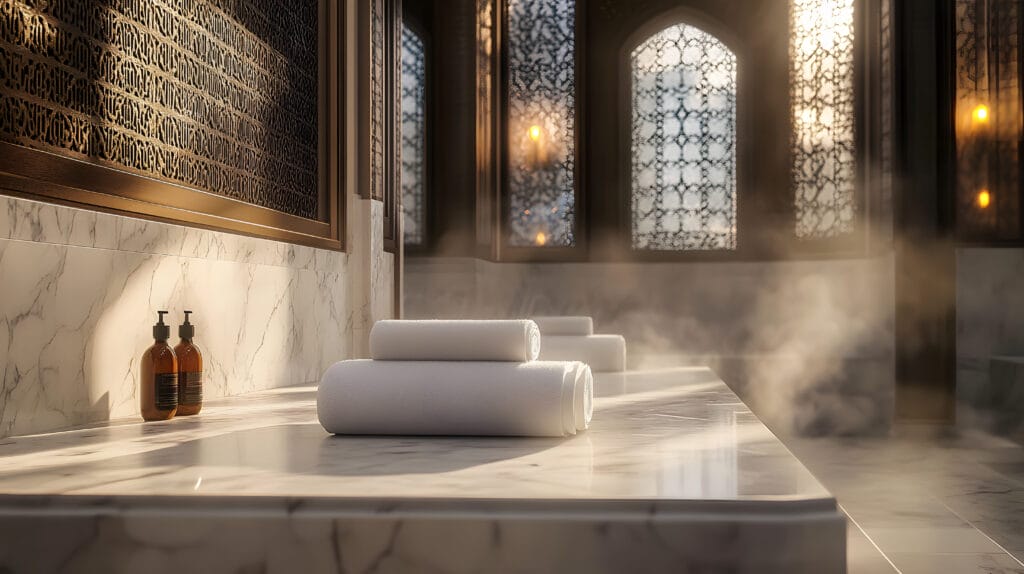
The hammam , or traditional Moroccan bathhouse, has been an integral part of Moroccan culture for centuries, deeply rooted in both Islamic and pre-Islamic traditions. Historically, hammams were not only places for personal hygiene but also communal spaces for social interaction and relaxation. They play a vital role in Moroccan daily life, where they are often visited weekly or monthly as part of a routine ritual.
The hammam is more than just a bath; it’s a ritual that promotes relaxation and social connection. Visitors typically find themselves enveloped in warm, fragrant steam, while skilled attendants use a “kessa” glove to exfoliate the skin with traditional black soap, known as “beldi soap.” The process removes dead cells, revealing a radiant, smooth complexion. The experience can vary significantly from one hammam to another, ranging from luxurious spas with elaborate decor to more modest local establishments that capture the essence of traditional bathing.
Given this diversity, it’s wise to consult your accommodations for recommendations on the best hammams nearby. They can guide you to places that align with your preferences, whether you’re seeking a lavish experience or a more authentic, local atmosphere. By choosing the right hammam, you can fully immerse yourself in this essential aspect of Moroccan life, leaving you not only with silky smooth skin but also with cherished memories of your journey. We visited two hammams in Morocco, and it was a fun and unique experience, and our skin was very happy.
Reflection
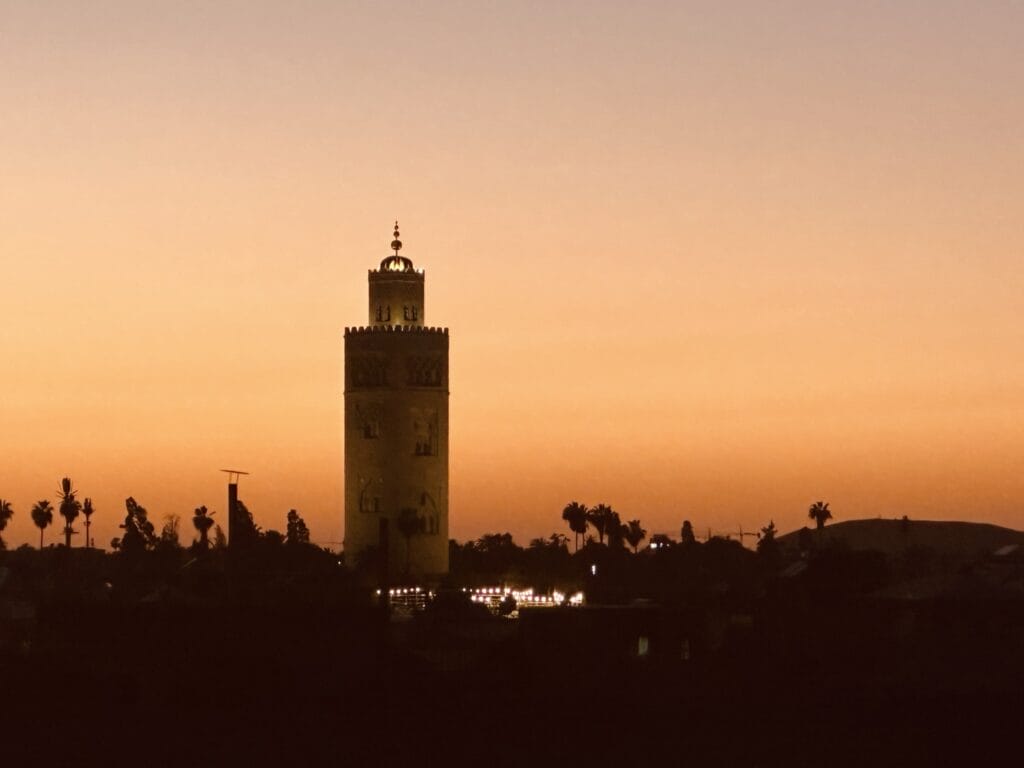
Respecting Morocco’s customs and traditions not only enhances your travel experience but also fosters cultural understanding and positive interactions with locals. By embracing practices such as proper handwashing, using the right hand for greetings, understanding the role of women in Moroccan society, and avoiding culturally insensitive behaviors, visitors can demonstrate respect for Moroccan culture.
Morocco’s rich cultural heritage offers a tapestry of traditions that, when approached with sensitivity and respect, can transform a visit into an unforgettable journey. Understanding the significance of mint tea, participating in the hammam experience, or engaging in the vibrant souks can deepen your connection with the Moroccan people and enrich your travel experience, highlighting the importance of cultural exchange and mutual respect in today’s globalized world.
Where to stay when visiting Morocco
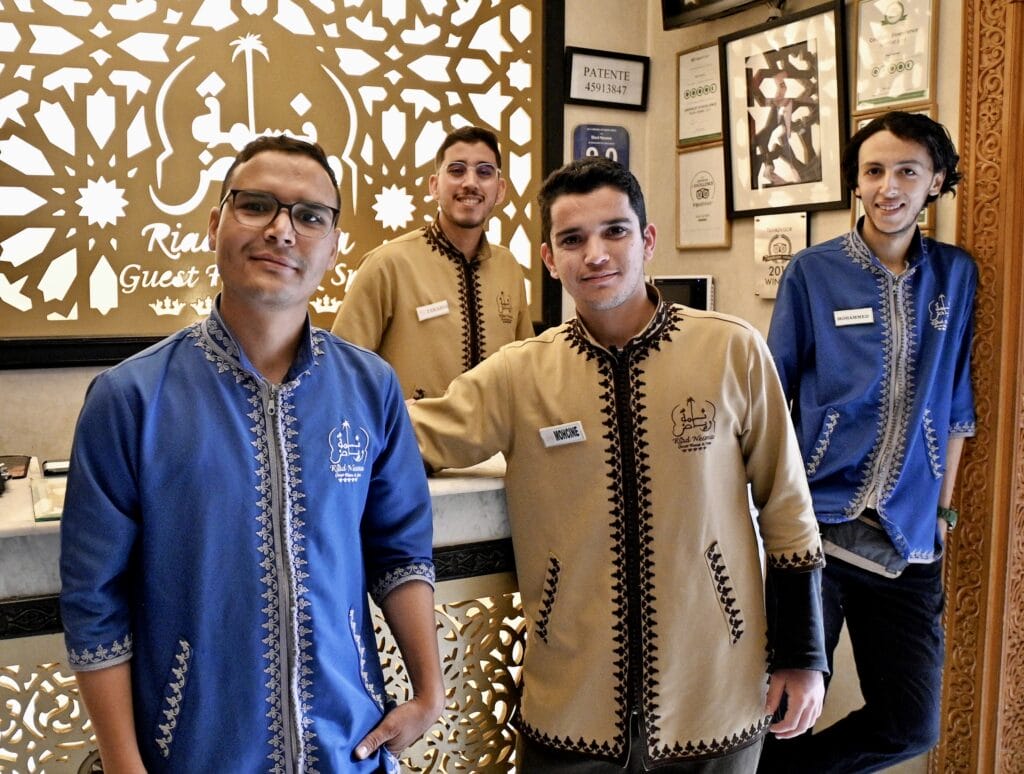
It is important to price out accommodations on various sites. Expedia is a US-based company, whereas Booking.com is Europe-based. Not all properties appear on both, so it is ideal to check both out. Our personal first choice is Booking.com . If the establishment has a website, check the price there as well. Click the link below to check out hotels and vacation homes in the area. It may be just the motivation you need to start planning that next grand adventure.
The markets in Morocco are beyond compare. Check out our article, The Markets of Morocco .
Morocco Customs and Traditions Photo Gallery





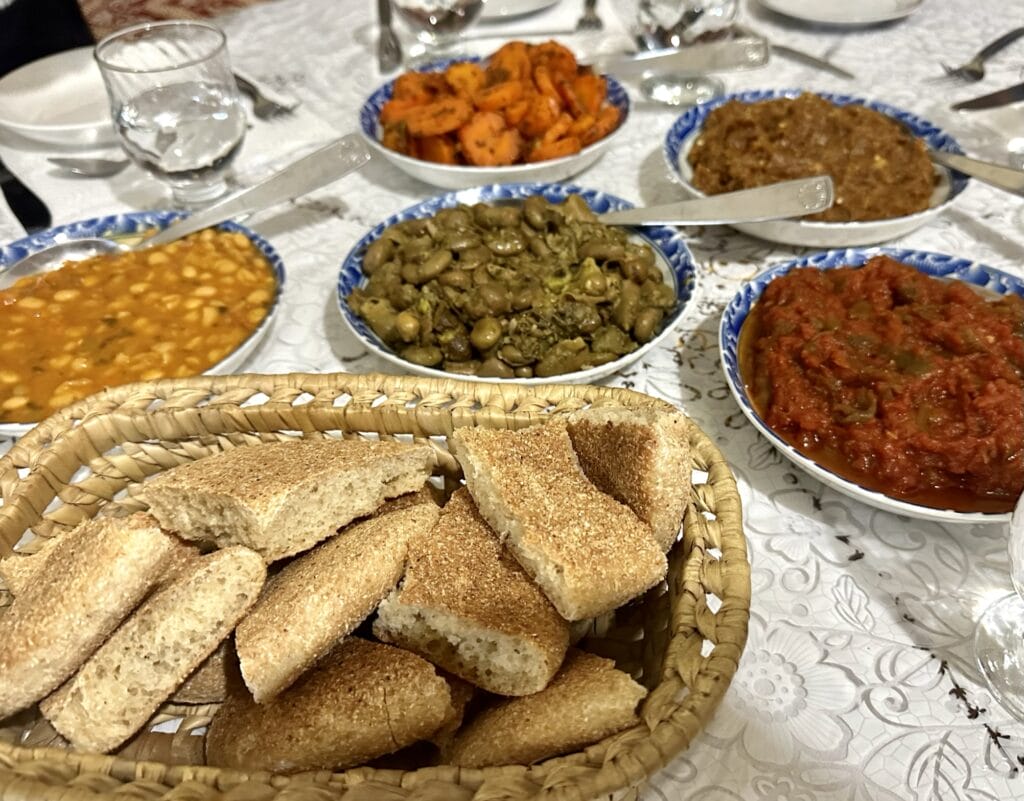











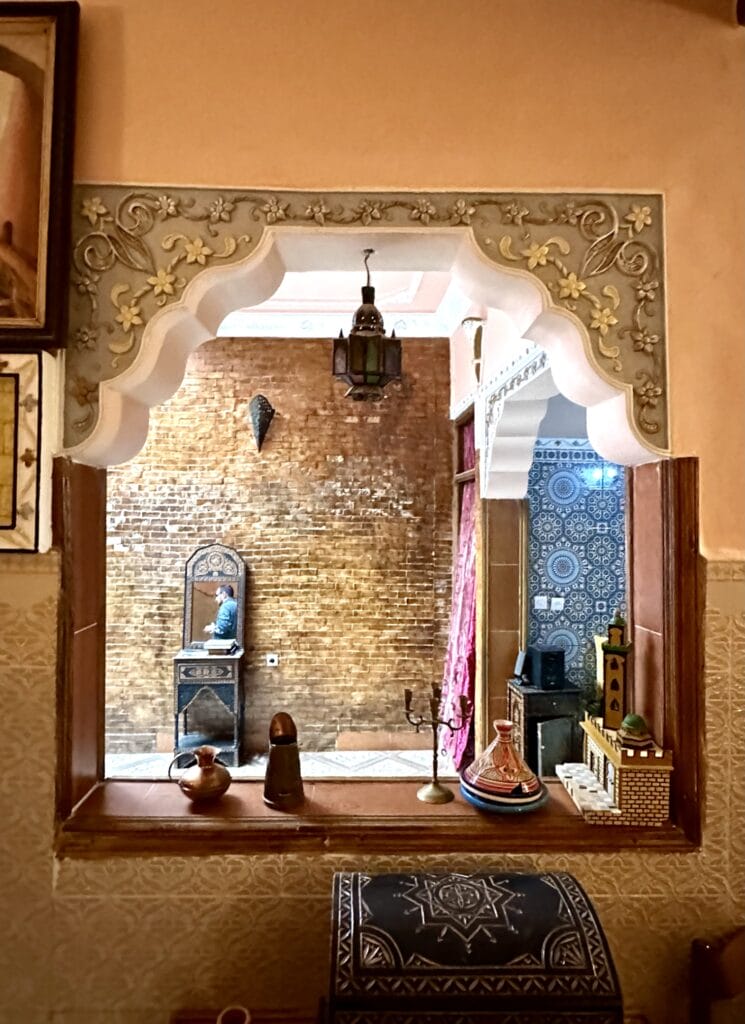







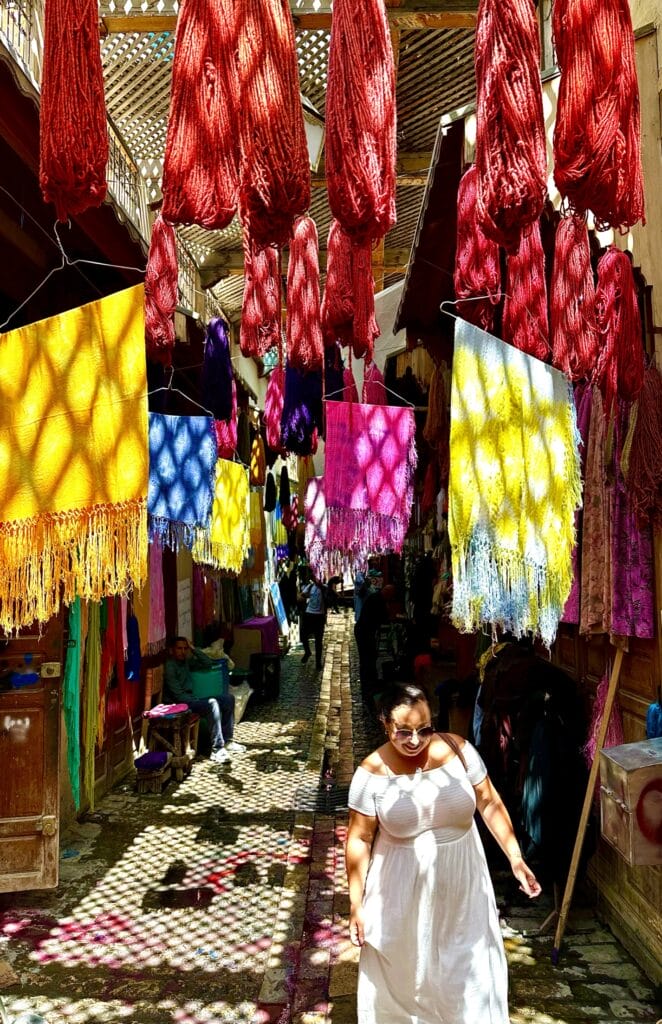

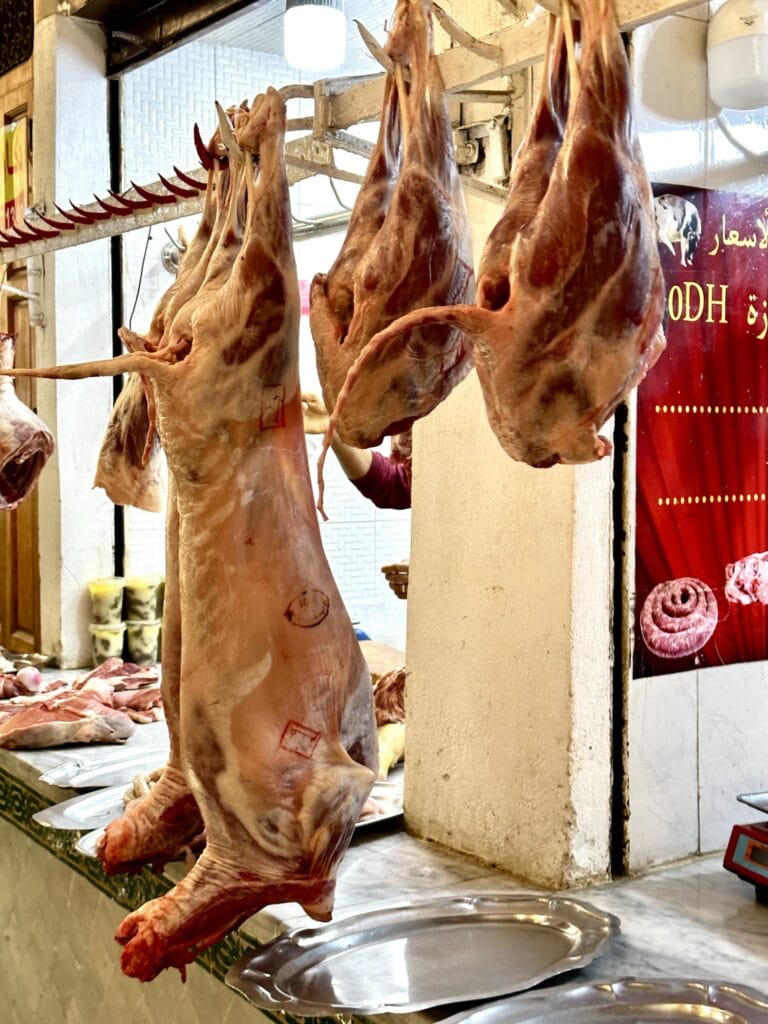

Our Top Recommended Travel Products and Services
Travel Insurance
Squaremouth.com
Our favorite travel insurance site!
We could not be stronger advocates of being well-insured—not just for the little stuff but for the big things like medical emergencies. We never leave home without it. Our go-to place is Squaremouth.com . It does a fantastic job with its user-friendly interface and uses top-rated and reputable insurance carriers. They also mediate on your behalf if you have problems.
To empower you as a consumer, we suggest you read our blog post on the importance of travel insurance and how to get the best coverage from top-rated companies for an affordable price.
MedjetAssist
Medical transport back home from anywhere in the world
They are the premier global air medical transport. One caveat to travel insurance is that medical evacuation usually gets you to the closest facility to care for you. Medjet gets you back to the U.S. to the hospital of your choice once you are stable enough to fly. A Medjet membership is only for medical transport. Medjet Horizon offers expanded coverage. They have individual trip policies starting at $99 and annual policies for around $300. Most of their policies limit the age to 74.
To learn more about how Medical Evacuation membership with Medjet Assist works, check out our blog post for a more detailed review.
Accommodations and Airfare
Expedia
and
VRBO
Hotels, home rentals, BNBs, flights, and other transportation & tours
Expedia is a US-based company whose mission is to power global travel for everyone and everywhere. focuses on independent travel, and using sites like Expedia makes that possible. Every aspect of travel you need, from airfare, accommodations, rental car, and cruises to activities to do at your destination, can be booked on Expedia .
Booking.com
Hotels, Home rentals, BNBs, Flights, and other Transportation & Tours
Booking.com connects millions of travelers to memorable experiences, various transportation options, and incredible places to stay – from homes to hotels and much more. It is one of the world’s largest travel marketplaces for established brands and entrepreneurs of all sizes. It is our preferred booking site.
Transportatio n
Daytrip
Personalized city-to-city private car transfer service
Daytrip is an affordable private car service for city-to-city transfers around the world. We love their service, and it costs much less than renting a car. You can enjoy comfortable, stress-free travel with the added bonus of scenic sightseeing stops along your journey. For example, we used them between Budapest and Vienna, making some fantastic stops along the way. Their professional drivers and customizable routes ensure a smooth ride while allowing you to explore hidden gems and local attractions.
To learn more about how Daytrip, check out our blog post for a more detailed review.
Travel Experiences
Viator
The leading marketplace for travel experiences
Viator believes that making memories is what travel is all about. And with 300,000+ experiences to explore—everything from simple tours to extreme adventures (and all the niche, interesting stuff in between)—making memories that will last a lifetime has never been easier. We use them often during our travels and love their liberal cancellation policy.
Communication products for seamless connectivity overseas
GigSky International eSIM Data Plans
Local Prices. No Roaming. Fastest Networks.
GigSky eSIM keeps travelers seamlessly connected worldwide without the hassle of swapping physical SIM cards or facing unexpected roaming charges. With affordable data plans and instant activation, you can enjoy reliable internet access in over 190 countries, making travel more convenient than ever. They have a great offer, a 100 MB data plan for free, and no credit card is required. They are that confident you will love their product!
Enjoy 10% off all GigSky Plans (except cruise and inflight) with our discount code WCOMPASS10
To learn more about how GigSky, check out our blog post for a more detailed review.
Shopping
Amazon Storefront
An excellent source for all travel essentials and guides that we have vetted ourselves
Amazon is one of the most comprehensive online shopping sources in the world. Teams worldwide provide lower prices, better selection, and rapid delivery on behalf of customers. They offer a vast inventory, and their 1.7 million small and medium businesses worldwide selling on Amazon.com offer extensive options to customers.
This article contains affiliate links. If you use these links to buy something, we may earn a small commission at no additional cost to you. Thank you!
Do you have a question for us or have a comment?
Check out our most recent posts
View AllTokyo Unleashed: Delighting in the Fun Side of Japan’s Capital
November 19, 2024Cinque Terre: A Journey through Italy’s Five Charming Villages
November 17, 2024Exploring Trim Castle: History, Architecture, and Visitor Guide
November 13, 2024Level8 Luggage Review: A New Standard in Travel Gear
November 12, 2024Why Milk is the Perfect Hydration Boost for Plane Travel
November 12, 2024Learn more about Moroccos Desert Wonders: Unraveling the Beauty of the Sahara








